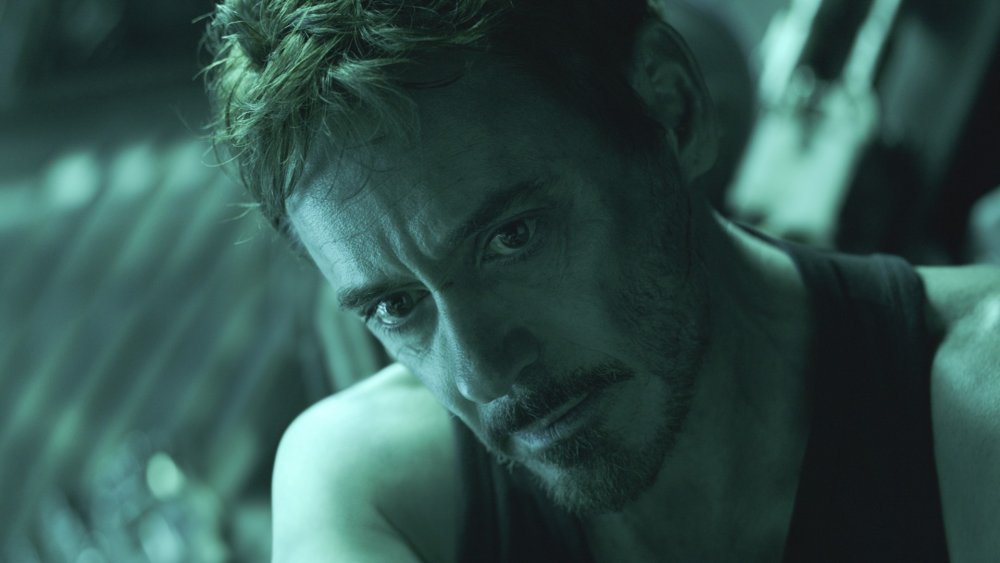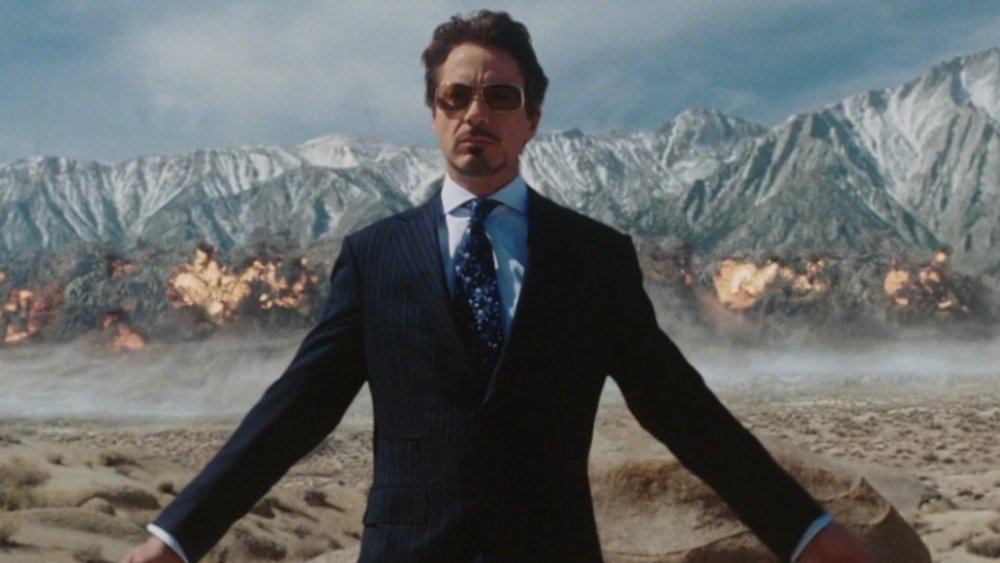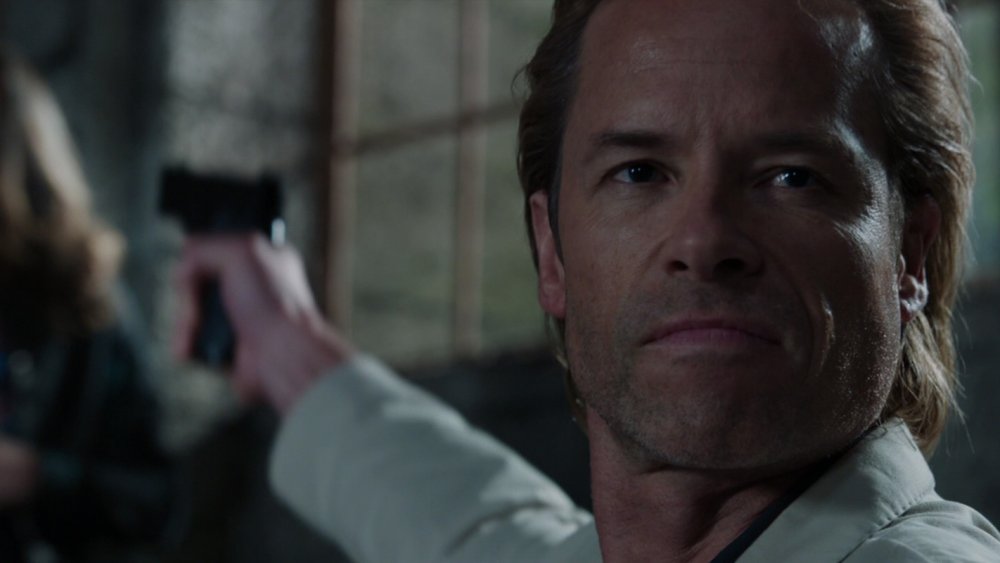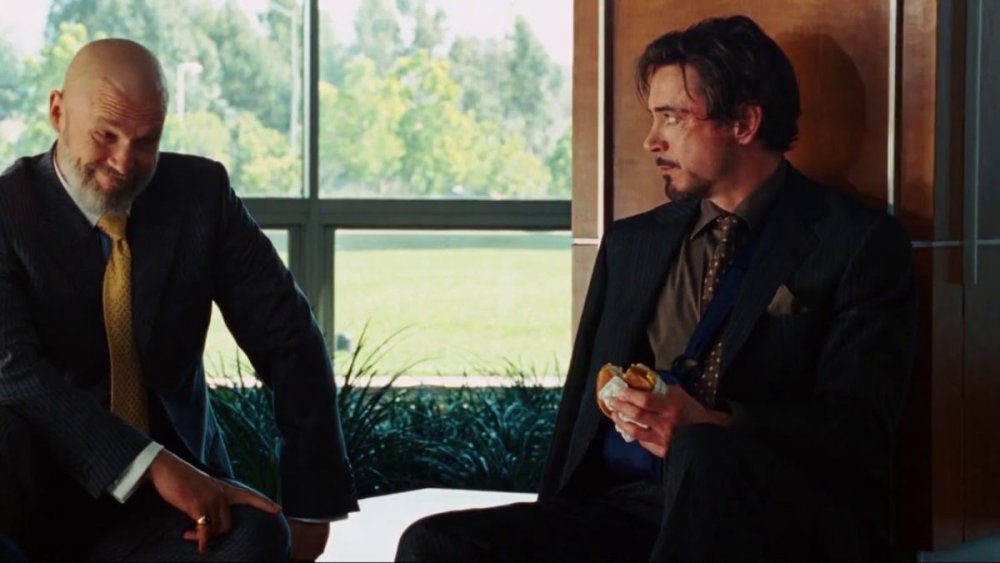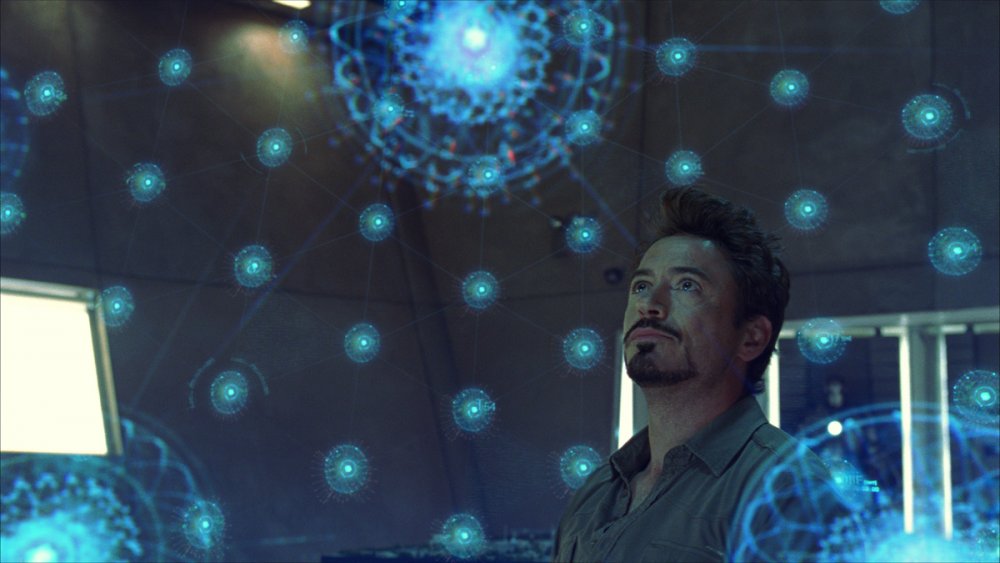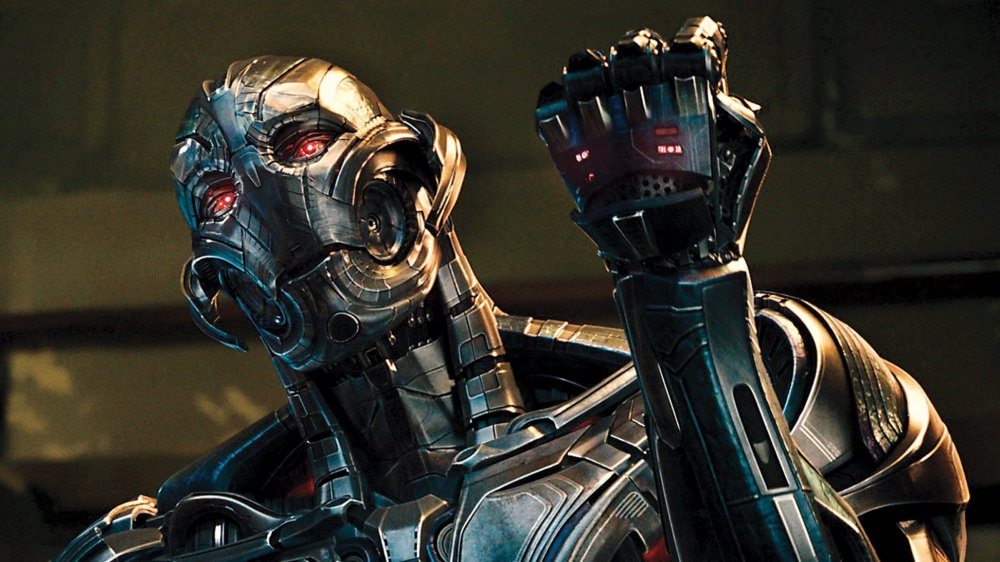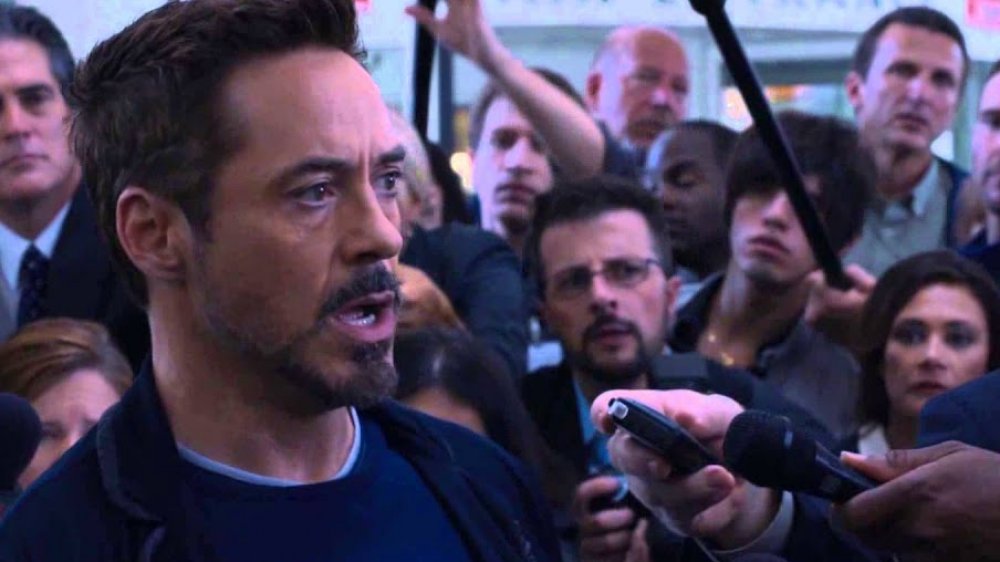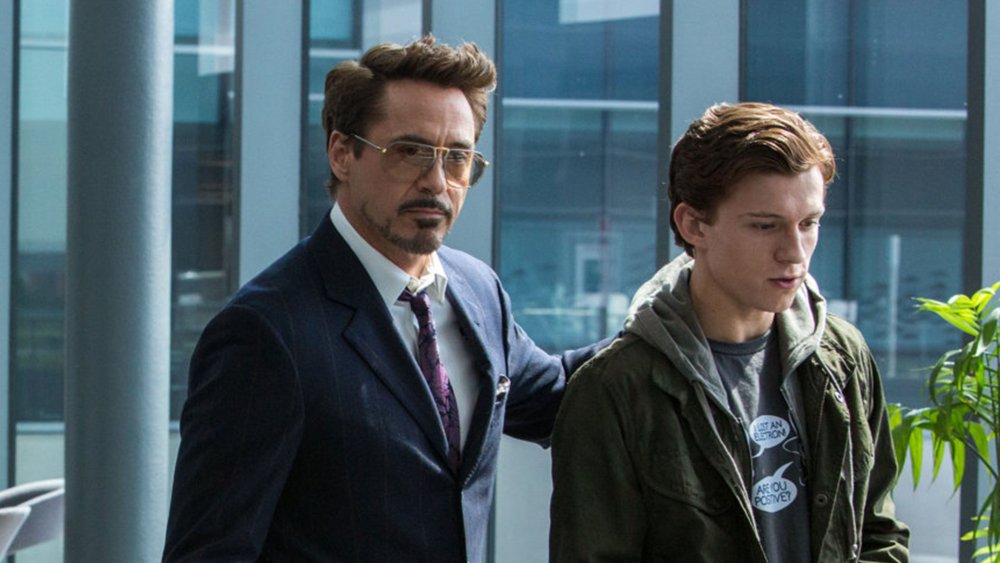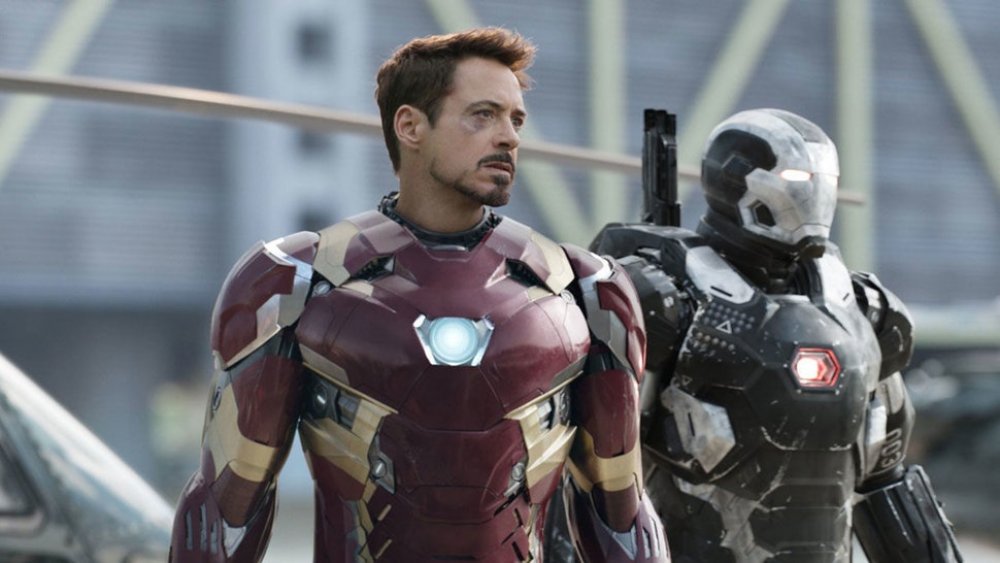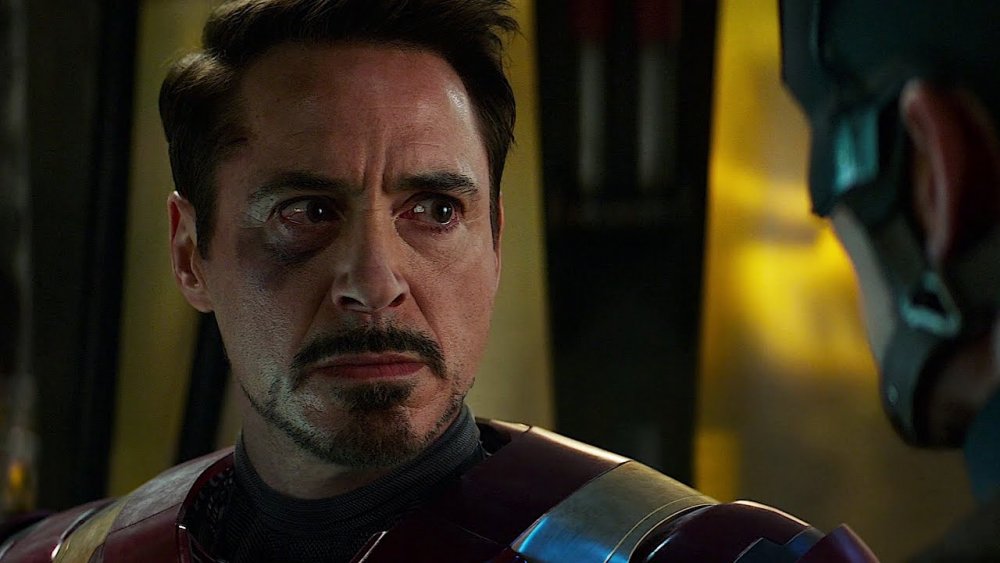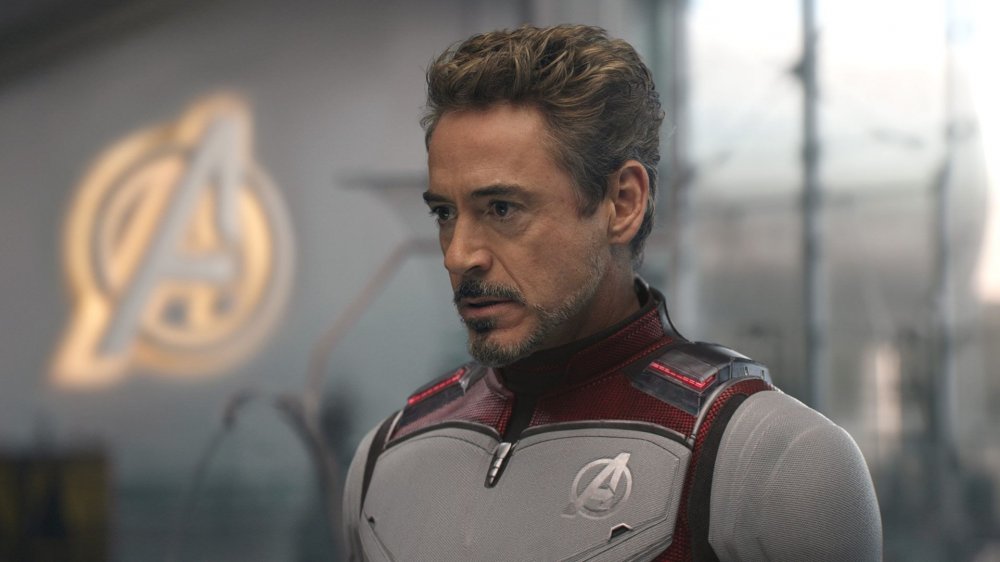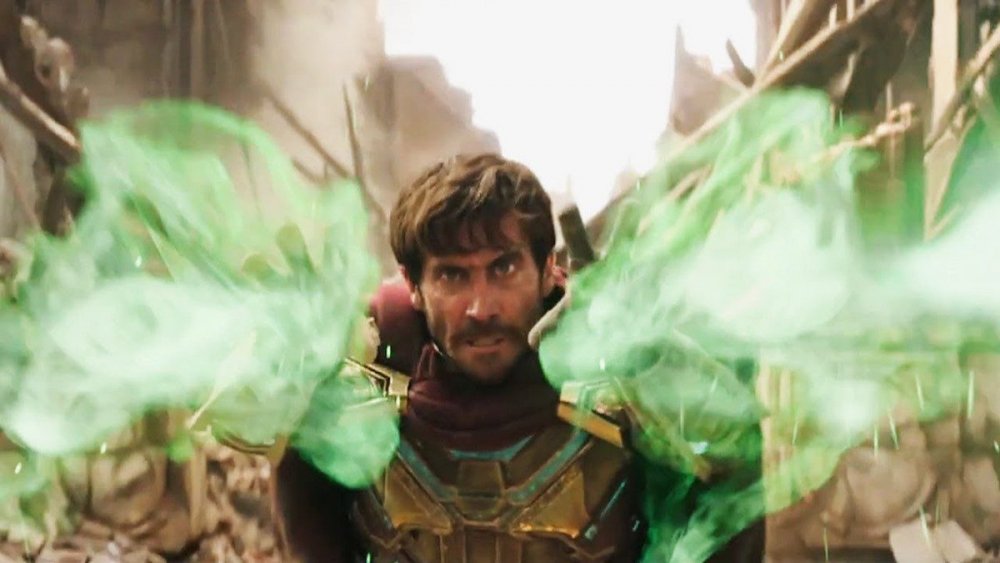The Biggest Mistakes Iron Man Has Made In The MCU
Tony Stark's sacrifice at the end of Avengers: Endgame isn't the first time he's risked everything for the sake of others. He doesn't expect to survive flying the nuke into the portal at the end of Avengers. He boards Ebony Maw's ship fully expecting the trip to be one way in Avengers: Infinity War. He's put his life on the line so many times, you could call it a habit.
But part of what makes Tony Stark such a compelling character is that he's a man of many flaws. Sure, he's prone to acts of selflessness, but he's also arrogant, impatient, more full of daddy issues than Luke Skywalker, and prone to holding a grudge. Sometimes those flaws even lead him to make huge mistakes. We all make mistakes, of course, but Tony's power and influence is such that his have far-reaching consequences. Some of these mistakes are minor — but some have shaped the MCU's very foundations. These are the biggest mistakes Tony Stark has ever made.
Building weapons
Tony's missile test in Iron Man is one of the most memorable moments of a great film. But things change when Tony is captured by the Ten Rings. Once he sees the violence and misery his creations are causing, he vows to get out of the weapons-making business altogether. Unfortunately, the consequences of his earlier career don't fade away as soon as his post-captivity press conference ends.
Before he makes the decision to put the business of war aside, Tony's already planted seeds that ultimately flower into new threats. His time as a war profiteer made him the target of the Ten Rings in the first place, of course, as well as Obadiah Stane. In 2015's Avengers: Age of Ultron, we learn the only two survivors of Hydra's experiments with the Mind Stone — Pietro and Wanda Maximoff — have allied themselves with villains specifically to get back at Tony Stark for providing the weapons that killed their parents. It is, in fact, the Maximoffs who turn the tide on the Avengers in one of their first battles with Ultron, as well as sparking the Hulk's rampage in Johannesburg. Tony's work in war enabled all of that — something he was surely aware of.
Blowing off Aldrich Killian
In a flashback early in Iron Man 3 that shows us the first, brief meeting between Tony Stark and Aldrich Killian, Tony's narration admits his mistake up front. Tony is cornered in an elevator by Aldrich Killian, a young scientist looking for help with his new company, Advanced Idea Mechanics. Tony promises to meet Killian on the roof in five minutes, then predictably never shows. We learn later it was the humiliating experience of waiting for Stark on the freezing roof that inspires Killian to go down a much darker road than he'd originally planned. A little over a decade later, Killian nearly kills Tony, Pepper, Happy, and even the president.
Now, we can't blame Tony Stark for Killian's crimes. Lots of people have been told no or been blown off by potential colleagues or investors without turning into fire-breathing supervillains. But that doesn't mean Tony didn't make a mistake, or that what Tony did wasn't cruel. He could've just told Killian he wasn't interested — instead, he chose to trick a guy into waiting on a roof at night. In winter. In Switzerland. Characteristically, Tony chose to be a jerk and in Iron Man 3 he's forced to pay for it.
Announcing Stark Industries' disarmament too soon
After freeing himself from captivity in Iron Man, Tony doesn't even wait to visit his own home before insisting on a press conference. Without a warning to Obadiah, Rhodey, or anyone else, Tony announces Stark Industries is going to stop making weapons. This news sends the company's stock into a nosedive and turns some of his closest friends against him, not to mention the board of directors.
Tony needed to disarm Stark Industries. We're not arguing he shouldn't have. Once he saw how his weapons were being used and what they were doing to people, he had to put a stop to it. But making an announcement so soon after returning home wasn't a smart move — even in terms of pursuing peace.
He knew the Ten Rings were getting their hands on Stark tech, but not how. If he had kept his plans to himself, Tony could have investigated and figured out it was Obadiah Stane who sold the weapons to the terrorists. He might have even been able to sniff out the revelation that it was his father's old friend who put the hit out on him. By making the announcement, Tony forced Obadiah's hand, and ensured further bloodshed. Making one's intentions clear is admirable, but sometimes, it's best to take things slowly.
Not being open about his Palladium poisoning
In Iron Man 2, we discover that the arc reactor keeping Tony alive is slowly poisoning him with palladium. Confiding in no one other than his AI assistant Jarvis, Tony does what he can to slow the illness and prepare for his death. He signs off the leadership of Stark Industries to Pepper Potts and allows Rhodey to take one of his Iron Man suits.
It takes Black Widow's infiltration of Stark Industries for Nick Fury to discover Stark's condition. Fury arranges for Howard Stark's research material to be brought to Tony, who uses it to create a reactor powered by a new, non-toxic element. Fury clearly sees him as integral to the Avengers Initiative, and if he had known earlier about the palladium poisoning, he would've given Tony what he needed right away. There'd have been no need to send Black Widow to spy on him, no need to ominously reshuffle his company's leadership. And with a new power source for his armor as well as a body free of palladium poisoning, Tony would've been in a much better position to face the threat of Ivan Vanko. He didn't need to suffer in silence, and doing so only made things harder for everyone in his life.
Everything regarding Ultron
When you just consider Iron Man's mistakes, this is likely the first thing that springs to mind. In Avengers: Age of Ultron, Tony and Bruce Banner use the Mind Stone to bring the artificial intelligence Ultron to life, in the hopes that it can serve as a defense against future alien threats.
The problem isn't just that Tony creates Ultron, it's how he does it. In order to bypass any debate or objections, Tony and Bruce proceed with their work without speaking to any of the other Avengers. If they shared what they were doing — and if the rest of the team agreed to let them go forward — safeguards could've been put in place. There's no guarantee those safeguards would have worked, but at the very least the Avengers would have been better prepared for Ultron's betrayal rather than being blindsided by his assault in the middle of a party.
Also because of Tony's silence, the team we see in Age of Ultron is a much more fractured one. They're trying to save the world while at the same time dealing with what they see as a betrayal by one of their own. That's why things literally come to blows later in Avengers Tower when Tony and Bruce try to bring Vision to life. Vision proves to be an invaluable ally, but the other Avengers can hardly be blamed for trying to stop Tony and Bruce from repeating a deadly mistake.
Threatening the Mandarin
It's tough to be too judgmental of Tony threatening the Mandarin on live television. He'd just seen one of his best friends nearly killed by an explosion attributed to the terrorist, and we've all done and said dumb things when we we're upset. Who can say they wouldn't have done the same thing in his shoes?
That said, it was still a mistake and the proof is ... well the proof is in the Pacific Ocean, not far from where Tony Stark's mansion used to be. Not long after Tony's televised challenge to the Mandarin, three helicopters show up and blow Tony's home off its cliffside, nearly killing Tony, Pepper and scientist Maya Hansen. Tony survives only because of his armor, which flies the unconscious Stark to Tennessee and promptly loses all power upon arrival.
Just before the attack on his home, Stark was looking into the Mandarin's attacks and was about to head to Tennessee to investigate one of the bombings. If he hadn't already threatened the Mandarin, Tony might have made it to Tennessee with a functioning suit of armor. He also might have found out a lot more about Extremis and Aldrich Killian's plans before things got physical between him and Killian's people. Instead, Stark's threat forced Killian's hand and put the conflict into play sooner than it had to be.
His mentorship of Spider-Man
We love Iron Man and we love Spider-Man. So it's easy to forget how insanely irresponsible it is of Tony Stark to recruit 15-year-old Peter Parker in 2016's Captain America: Civil War.
Let's start with the fact that Parker gets recruited at all. Stark clearly already knew Parker was out there, but waited to make contact. What did he wait for? Well, he waited until he needed help fighting some of the most dangerous people on Earth, including the world's greatest marksman and a Hydra-brainwashed assassin. Once Parker agrees, Tony takes a minor on a trip to another country and lies to his legal guardian in the process.
Once that fight's over and it's no longer convenient for Tony to have regular contact with Peter, he makes Parker think he's forgotten about him. In Spider-Man: Homecoming, Parker tries again and again to get a call or text back from anyone other than Happy, but it isn't until the Staten Island Ferry disaster that Tony shows his face. And when he does show up, he browbeats Parker and demands his suit back — the suit he was secretly tracking the movement of a minor with, let's not forget. You could argue this was all some kind of Yoda-like test on Stark's part, but looking at it through Parker's eyes, it's tough to not see it as straight-up jerk behavior.
Not giving Cap the benefit of the doubt
We're not going to argue whether or not supporting the Sokovia Accords was a mistake on Tony's part. Like it or not, the world had good reason to want to Avengers on shorter leashes. It's easy to wag your finger at Tony and the other pro-Accords heroes while watching the movie, but from the point of view of the civilians of the MCU, the notion that people in masks have the freedom, without oversight, to dole out justice as they see fit is a scary idea.
That said, Tony bears as much responsibility as Captain America for the violence that breaks out in Leipzig. When confronted with Cap's words at the airport, Tony should've given his teammate the benefit of the doubt. Whether they liked each other or not, the two had been through enough to earn one another's trust. Cap and Iron Man had honest disagreements about the Sokovia Accords and Bucky Barnes, but Cap told Tony where they were headed and why. Tony had no reason to believe Cap was lying, and if he thought Bucky was manipulating him, then the whole team could've accompanied them to Siberia. Things may have worked out a lot differently if the Avengers had arrived in Siberia united. Instead, they beat the heck out of each other.
Going after Bucky
It is difficult to blame Iron Man for attacking Bucky at the end of Civil War. Who wouldn't want to tear Bucky Barnes to pieces if they'd just watched a recording of him murdering their parents?
Still, it was the wrong thing to do and it's a mistake with far-reaching consequences. As understandably upset as he was, Tony was smart enough to know he was doing exactly what Zemo wanted him to do. Tony's assault on Bucky forces Captain America to choose sides, and the battle between Tony and Steve drives a wedge between them. Because of that split, the Avengers are too fractured in the beginning of Avengers: Infinity War to provide a united front against Thanos.
If Tony had stayed his hand, things might have turned out a lot differently once Thanos came calling. In spite of everything, Tony already seemed sympathetic to Cap and the outlaw heroes at the end of Civil War. If he and Cap hadn't come to blows in Siberia, maybe he would've gone underground with the others. Or at the very least it wouldn't have been quite so hard to make that phone call from Stephen Strange's mansion at the beginning of Infinity War.
Losing the Tesseract
When the Avengers go back in time to recover the Infinity Stones in Endgame, Stark is part of the team sent to New York City circa 2012. Along with Ant-Man, Tony's tasked with getting the Tesseract, AKA the Space Stone. Unfortunately, they end up being the only Avengers to fail on their first try. On the ground floor of Avengers Tower, Tony gets the briefcase containing the Tesseract, but on his way out of the building he ends up on getting knocked across the room when the Hulk emerges from a staircase and hits Tony as he slams open the door. The briefcase goes sailing, the Tesseract pops out, and Loki manages to get his hands on it, which he uses to escape.
Now, we can't say Tony should've seen the door coming. After all, the possibility of getting hit in the face with a door usually seems remote enough that you don't have to plan against it. Still, he did lose the Tesseract. As a result, he and Cap have to go back farther in time to get the Stone from S.H.I.E.L.D. Not to mention that Loki's escape causes an alternate timeline to form — one that can't be prevented by Cap's quest to return the Stones.
Failing to foresee Mysterio
In 2019's Spider-Man: Far from Home, we learn that Tony had some plans for his death. In particular, he has Nick Fury give E.D.I.T.H. — an artificial intelligence with control over Stark's databases as well as an orbital supply of weaponized drones — to Peter Parker. Disgruntled former Stark employee Quentin Beck targets Parker with a scheme to get the AI from him and use it to sell himself as the world's greatest superhero.
The very fact that Stark wills such a powerful tool to a 16-year-old boy — a boy who, not long ago, he didn't even trust with his own suit — is kind of nuts. But he also should have realized that possessing something like E.D.I.T.H. would make Peter a target. If the highly questionable decision to give the device to Peter Parker had to be made, then someone other than Nick Fury and Happy should've known what was going on. Someone more securely in the "super" category should've been watching Peter's back and making sure he didn't hand it off to the first person to pretend to be a positive role model.
